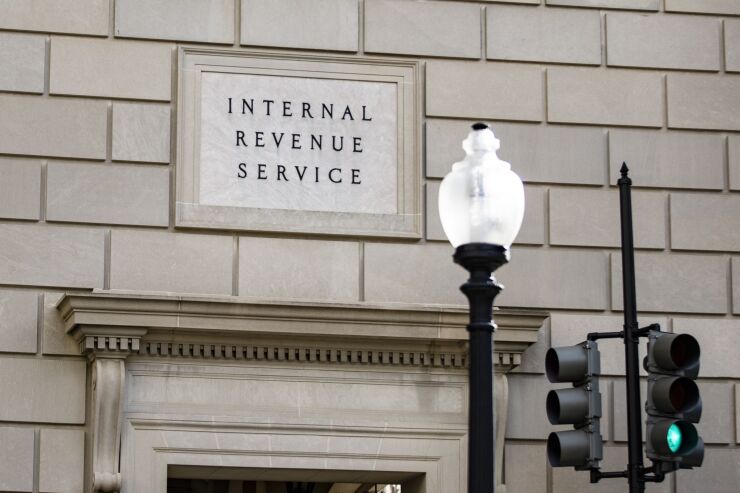The Internal Revenue Service mailed out nearly 90,000 premature notices and demands for overdue taxes to taxpayers last year, even though the filing date had been extended.
A
However, the taxes weren’t actually due yet. “The notices showed that balances were owed even though the taxes were not actually due because of the filing extension,” said the report.

The IRS did include a form with the letter admitting the notice might be premature, but that still led to confusion for many taxpayers and tax professionals last year who had trouble reaching the IRS over the phone to clarify the situation. “Although the majority of these Notices and Demand included stuffers to explain the correct notice and payment due dates, taxpayers could be confused as to how to proceed, whether they received a stuffer of explanation with their notice or not, simply due to the original notices including incorrect information,” said the TIGTA report. “The IRS had the opportunity to prevent undue burden to taxpayers by purging the outdated and incorrect notices and sending them at a later date.”
The IRS has been facing a series of challenges during the pandemic that has been straining its overworked staff. Many employees worked remotely last year during the early months of the pandemic while millions of pieces of unopened mail, including tax payments, piled up in trailers outside IRS facilities. At the same time, the IRS was supposed to be pursuing a widely publicized People First Initiative that was meant to ease the economic impact of the pandemic on taxpayers. The TIGTA report looked at how the IRS handled those dueling priorities.
The IRS’s People First Initiative included steps to help taxpayers by providing relief with various problems ranging from easing payment guidelines to postponing compliance actions during the period from April 1, 2020, through July 15, 2020. The People First Initiative aimed to reduce the tax compliance burden on taxpayers by temporarily adjusting and suspending some of the agency’s main compliance programs to help people facing the challenges of the pandemic.
But despite the People First Initiative, thousands of automated tax collection notices continued to be mailed by the IRS’s computer systems, even though the agency knew the taxes weren’t overdue yet for many of the taxpayers receiving them.
“During the start of COVID-19, the IRS was impacted in many ways,” said the report. “IRS sites closed for months, thus postponing everyday operations such as mailing notices and receiving and processing correspondence from taxpayers. During this time, the IRS had to act and make decisions as to how to proceed, and some of the decisions potentially caused confusion and undue burden to numerous taxpayers who received erroneous collection notices. Upon reopening its print sites, the IRS decided to issue millions of notices to taxpayers that had generated during the shutdown, many with erroneous notice dates and payment due dates.”
Nevertheless, the report acknowledged, the IRS did a good job in providing some forms of relief to taxpayers for the period covered by the People First Initiative, including suspending defaults on installment agreements, not handing over delinquent accounts to private collection agencies, and avoiding the systemic filings of federal tax lien notices, automated levies and seizures.
“TIGTA did identify that, for 23 levies (14 taxpayers) issued by revenue officers, there was no indication of the required levy approvals during the People First Initiative time frame,” said the report. “The IRS took corrective action by contacting these taxpayers and issuing refunds or credit transfers on the levied funds. Additionally, TIGTA identified that 40 of 49 Notice of Federal Tax Lien filings by revenue officers were made in error, but the IRS took corrective action to withdraw them.”
TIGTA recommended that the IRS make changes to its processes to avoid sending erroneous notices that burden taxpayers. IRS officials partially agreed with TIGTA’s recommendation, saying they believe their solution of sending the incorrect notices was appropriate given the extraordinary situation. “However, management further stated that, should future circumstances cause the IRS to be faced with a similar decision, they will take this report’s recommendation into consideration,” said TIGTA.
“The nationwide state of emergency and the temporary closure of our Correspondence Production Services locations caused the IRS to accumulate thousands of notices of delivery, with outdated information,” wrote Darren Guillot, commissioner of the IRS’s Small Business/Self-Employed Collection unit. “These notices, which inform taxpayers of their obligations and rights, must be provided to taxpayers. IRS senior leadership considered several options, balancing the need to comply with statutory obligations, provide accurate information to taxpayers, and operate within the constraints imposed by the pandemic. Based on this analysis, we concluded that our approach was the best use of our limited resources that would minimize the risk of confusion on the part of taxpayers.”
Thus, the IRS included inserts with 87,000 of the notices explaining that the notices might be premature and advising taxpayers of their rights. “We believe our decision was effective for the vast majority of taxpayers and minimized the risks to tax administration,” Guillot wrote to TIGTA. “The pandemic was an unprecedented event that required us to make real-time decisions in a very resource-constrained environment. Should we encounter circumstances in the future that would require a similar balancing of resources, we will take your recommendations into consideration in our decision making.”




